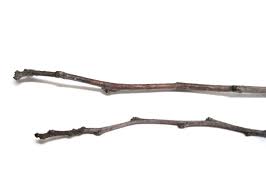记忆方法
1. from the Germanic base *twi- 'two', and so etymologically it presumably denotes a 'forked branch'.
2. tweak, twitch => twig.
3. 其实就是茅塞顿开的感觉。
2. tweak, twitch => twig.
3. 其实就是茅塞顿开的感觉。
中文词源
twig 小枝,嫩枝
来自古英语 twig,细枝,小枝,来自 Proto-Germanic*twigga,叉子,分叉,来自 PIE*dwo,二, 词源同 two.
英语词源
- twig
-
twig: English has two separate words twig. The older, ‘small branch’ [OE], which has relatives in German zweig and Dutch tijg, appears to have been formed from the Germanic base *twi- ‘two’, and so etymologically it presumably denotes a ‘forked branch’. The origins of twig ‘catch on, understand’ [18] are uncertain. It may be the same word as the contemporary but now defunct twig ‘pull’. This was presumably related to tweak [17] and twitch [12], which go back to a prehistoric Germanic base *twik-.
=> tweak, twitch, two - twig (n.)
- Old English twig "twig, branch, shoot, small tree," from Proto-Germanic *twigga "a fork" (cognates: Middle Dutch twijch, Dutch twijg, Old High German zwig, German Zweig "branch, twig"), from PIE *dwi-ko-, from *dwo- "two" (see two). Compare Old English twisel "fork, point of division."
权威例句
- 1. He shifted his weight and a twig snapped.
- 他挪了一下身体的重心,一根树枝咔嚓一声断了。
- 2. As the twig is bent so the tree is inclined.
- 从小偷针,长大偷金.
- 3. The sharp sound of a twig snapping scared the badger away.
- 细枝突然折断的刺耳声把獾惊跑了.
- 4. He broke off the twig with a snap.
- 他啪地一声把那根树枝折断了.
- 5. He heard the sharp crack of a twig.
- 他听到树枝清脆的断裂声.

